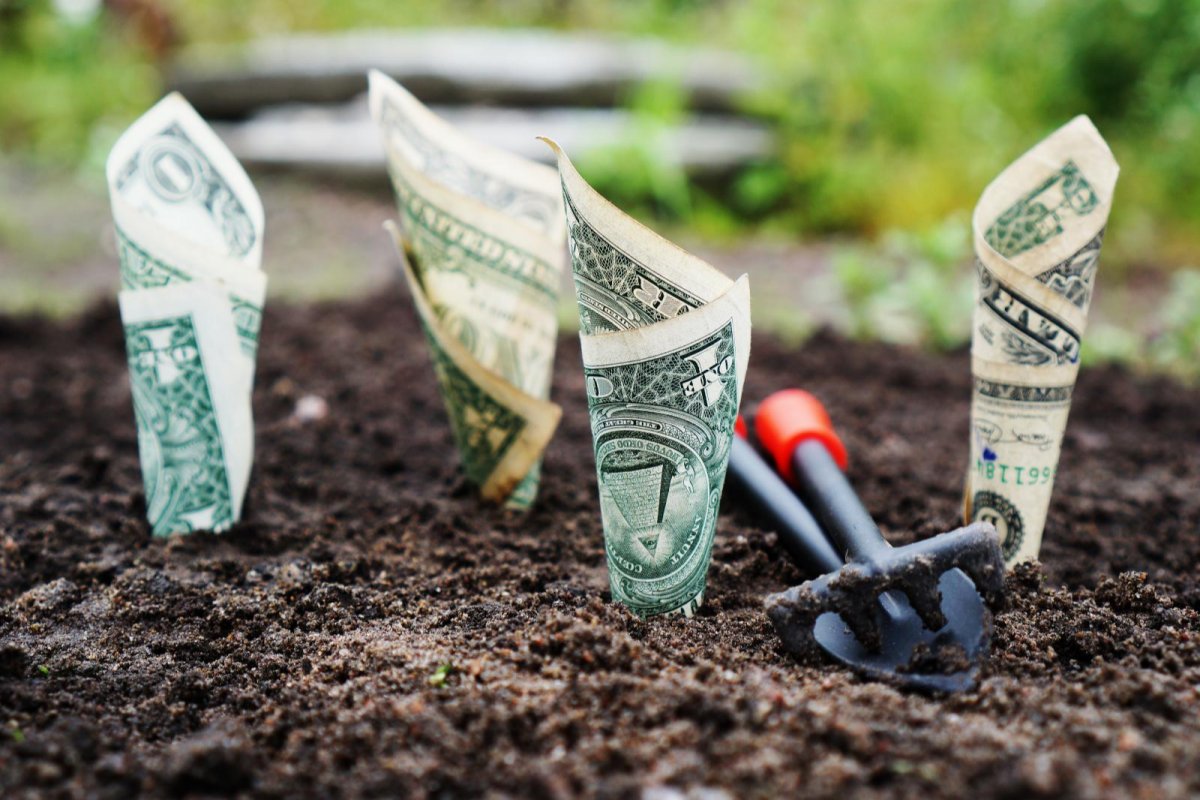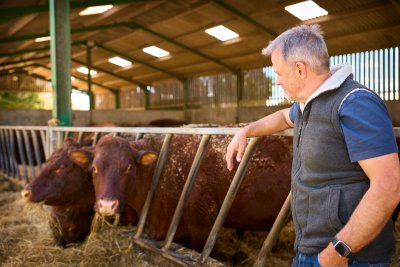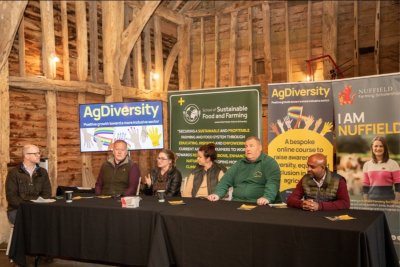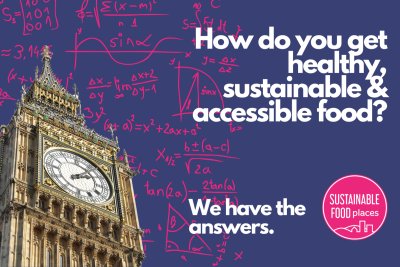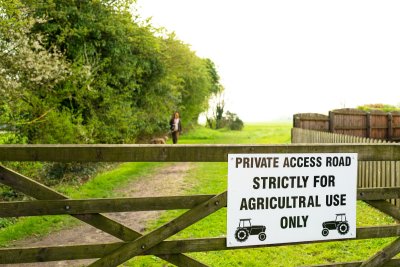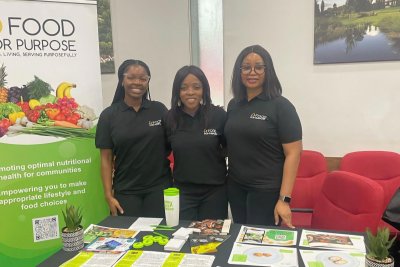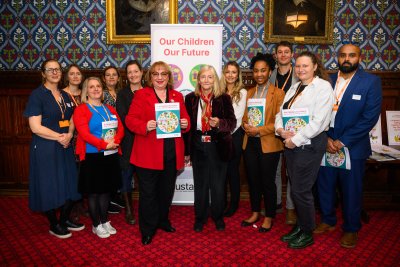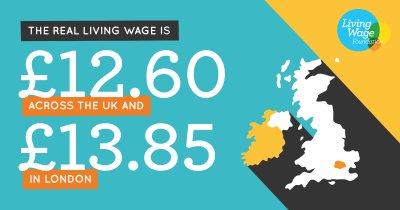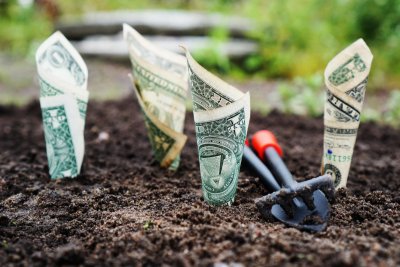 Dollars. Credit: Pexels
Dollars. Credit: Pexels
The leaky food grid is failing us, farmers and the environment
How can we turn wealth-sucking food supply chains into health-giving food supply chains that are good for people, farmers, and the planet? asks Sustain’s Head of Sustainable Farming Vicki Hird.
Towards the end of last year, we published our Unpicking Food Prices report that revealed just how little profit farmers are making on five everyday food items, when sold through supermarket supply chains - typically less than a penny profit on a pack of apples, cheese, beefburgers, carrots or bread.
How can we ever make the food system work for people, farmers, and the planet, when costs are so high and profits so low? Farmers are squeezed ever harder, supermarkets compete viciously, and yet ever more people go hungry.
But the UK food system is a £164bn billion industry in the UK, so where is the money going? I’ve been asked that so many times since we released our report.
A dysfunctional food grid
The food supply chain is a bit like our water supply system – transporting food from where it is grown to where its used, often with major processing and storage in the middle. The costs are considerable compared to water, and it is much more complicated – but just as leaky.
All along the way, bits of cash are seeping out. Wealth is being extracted at an eye-watering scale, invisible to shoppers yet getting more attention as food prices rise and the climate crisis takes hold. Some people are doing very well indeed out of the consolidated and extractive food system and the cost-of-living crisis, but it isn’t the farmers, shoppers or often, really the supermarkets. Do we need a massive reform of this food supply network to stop the food chain leaks?
There are very few policymakers prepared to grapple with the systemic changes required to make the wealth flow more fairly to the places where it would really help.
These systemic problems are often hidden. Politicians seem to believe that the current, ultra-competitive retail setup, run by huge corporations (actually on a knife edge), will somehow magically provide a solution. Shelves are still loaded (well, not always) and, because the true costs are not factored in, food is still relatively cheap (not to everyone but that’s an income issue). And these huge companies appear successful when measured in old-fashioned business terms.
The supermarkets make profits largely on volume sales, on just a few high value lines and by extracting payments from suppliers. And they sell some products at a loss to lure customers in as they compete fiercely for every foot through their door. Their cutthroat deals, just in time processes and buying policies, have created a hugely abusive supply chain for farmers – largely indirectly as not many farmers sell directly to supermarkets. This has been recognised through the creation of the Groceries Code Adjudicator but regulations need to be stregthened and expanded to cover all supply chains. The intermediaries, some of the largest private food companies in the world (e.g. Nestle, Cargill) make profits from huge global operations, finding the cheapest raw materials globally and adding value through processing, marketing, packaging etc.
It is a strange world we live in where highly nutritious food, like vegetables are sold at a loss and highly processed products that give the least nutrition fill the shelves. Why are we not protecting good food supplies from harm?
Global and local wealth extraction
Food manufacturers and commodity traders are a major part of the leaky supply chain issue. Much of the trade in commodities* – basic goods like maize, wheat, soya, beef, and edible oils – is driving the growth in processed foods and industrially produced livestock, made with ever ‘cheaper’ raw materials from the land. The huge human and ecosystem cost, not included in the supply chain accounting, of the resultant greenhouse gas emissions, nature damage and diet-related ill health, deserves far greater attention.
Many British farmers grow commodity crops traded on global markets for processed goods. The food commodity billionaires are getting even more massively wealthy on the back of global food commodity trading and things are getting worse with hedge funds getting in on the action too. Since the start of the Covid pandemic, Oxfam data shows that “Food billionaires have seen their collective wealth grow by an estimated 45 per cent .. 62 new billionaires were created.” A recent Oxfam/Action Aid report revealed that “18 food and beverage companies made on average about $14bn a year in windfall profits in 2021 and 2022.“Global food prices rose more than 14% in 2022." Katy Chakrabortty, Oxfam’s head of advocacy, said
“These eye-watering excess profits are not only immoral, we are also seeing increasing evidence that a corporate bonanza is supercharging inflation, leaving millions of people in the UK and around the world struggling to pay their bills and feed their families.”
Can taxpayers' support help?
Huge issues arise as nature, ecosystems, workers, livestock are pushed to the limit as farmers have to intensify production to make a living. So, can and should government fill the gap between what farmers need and what they are paid? Not stop the leaks and abuse, but instead subsidise them enough to cope?
In reality, that is what happens. The current subsidy, the basic payments scheme (BPS) is vital income support for many farmers in England and for some well over half their income. For many it’s the difference between staying in business or selling up.
But it is now, rightly, being replaced by public good delivery support via Environmental Land Management (ELM) payments in England and sort of similar approaches in other nations. This may mean more farmers going bust or getting more intensive to cope, especially if the new payments are not accessible, understandable or well designed. Farmer opposition to the new policy has some logic from a business perspective; though the old income supports make no sense to the treasury, the taxpayer or society.
Yet a further loss of farm diversity, as smaller and medium sized farms go under or get amalgamated into bigger, means further harm to landscapes and wildlife and rural cohesion – when the market just doesn’t pay. A form of emergency support (not taken from the new public goods payments pot) does make some sense until we sort out the dysfunctional, extractive supply chains.
But we need more than taxpayer support.
New supply chains approaches needed
In short, what the last 60 years has built for us is an overly costly, complex, untransparent, non-resilient food system. One that is highly resistant to the very real changes needed to create a safe, healthy, climate adapted and nature friendly, economically viable farming and food system.
Decision-makers are only just beginning to recognise the huge climate changes we will need to adapt to in food and farming and are doing far too little. The Committee on Climate Change has made this abundantly clear, as policy is lagging far behind on the food and farming solutions.
More positively, I am sensing there is more willingness now to listen and certainly more transparency is being asked for.
Some communities and businesses – like the Better Food Traders, and farmer cooperatives - are building alternatives. Here, there is a recognition that shorter, direct, and values-led supply chains put fairness and wealth-sharing at the heart of the solutions to health, affordability, and climate-friendly food. It’s a start.
A nine point plan
The Environment, Food and Rural Affairs (EFRA) MP committee in Parliament is currently running an inquiry into fairness in the food supply chain, and the Competition and Markets Authority is engaged in looking at whether the retailers are ripping customers off.
I very much hope they look carefully at where the food wealth goes and suggest investment in solutions to sort out for good this leaky, unsustainable and unfair food grid.
There are nine areas that need action to achieve a healthy, far, resilient food system in the UK.
- New transparency rules making it easier for the different parts of the food system to understand costs involved and negotiate fairly. Farmers are already rather transparent with the farm business survey, Nix handbook, etc. – but what about the intermediaries and the retail sectors? Why is there no equivalent Food Business Survey published by Defra? The UK’s Agriculture Act 2020 envisaged more transparency – with care – so let’s do it.
- A suite of fair dealing regulations introducing new legally binding rules that cover more than the current, useful but narrowly focussed Grocery Code that the Adjudicator administers – along the ‘Golden Rules’ idea – for grocery retailers’ dealings with suppliers and ensure they are enforced. And…
- Bring in, ASAP, the new, legally binding rules to tackle abusive practices in the rest of the supply chain, with a strong enforcer, with the power to fine for non-compliances. We are still waiting for the Dairy Code that was consulted on by Government back in 2020, and there are many categories still needing attention. The recently announced horticulture and eggs inquiries need to start asap.
- Build up far bigger, alternative trading options for farmers increasing the capacity of the farmer and grower to have more control over supply chains, more diverse trading, and that means investing in new regional and local infrastructure like food hubs, processing, marketing and innovation. There are lots of ideas in our reports.
- Have a clear vision for land use and UK nutrition security (not food security per se as we need to eat differently for healthier and sustainable diets, and waste less) with a plan for both public and private action to secure a reliable supply of healthy, fairly-traded, and nutritious, affordable food as climate change starts to really bite and imports become ever less reliable. That means getting to grips with how to use our land for the right outcomes, with the right methods, with agroecological farming becoming the norm.
- DO SOMETHING about fruit and vegetables. It is urgent. The sector and public interest groups have laid down some useful ideas – short and long term – to get this sector off its knees. It’s had to do the supermarkets’ bidding for too long and this means we’ve got too little produced here, and it’s so intensive, making us vulnerable. We need a strategy to establish better intermediaries, fair dealing and building demand and we need to implement it - making it easier for everyone to eat a diverse range of delicious, fairly traded fruit and vegetables.
- Make affordable food a priority – a cross-departmental strategy needs to deliver incomes, wages and welfare, and a new food system that ensure availability and affordability of healthy food especially in low-income areas and food deserts, whilst curbing junk food marketing everywhere so that nutritious food is the easiest choice for everyone.
- Facilitate fair, sustainable global food trade setting core environmental, health, labour and animal welfare standards for domestic food and imports alike.
- Rein in extreme wealth and monopoly power - through supporting demands for global wealth taxes and other measures to address gargantuan industry profits and wealth to ensure that no one is left behind and nature is protected.
*Commodities are goods which are interchangeable with other goods of the same type
Sustainable Farming Campaign: Sustain encourages integration of sustainable food and farming into local, regional and national government policies.
Sustain
The Green House
244-254 Cambridge Heath Road
London E2 9DA
020 3559 6777
sustain@sustainweb.org
Sustain advocates food and agriculture policies and practices that enhance the health and welfare of people and animals, improve the working and living environment, promote equity and enrich society and culture.
© Sustain 2024
Registered charity (no. 1018643)
Data privacy & cookies
Icons by Icons8
